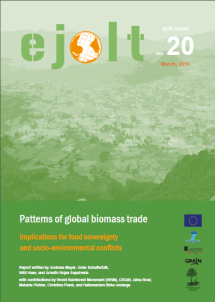
EJOLT Report 20: Patterns of global biomass trade
The report can be downloaded here
Abstract
In the late 20th and early 21st centuries, global trade in agricultural products grew more than three times faster than agricultural production. Nearly all the new land that had been put into production since 1986 was used to produce export crops. While higher volumes of agricultural production and trade increased the global availability of agricultural products, their benefits and negative impacts are not evenly distributed globally. From a regional perspective, the surge in agricultural production for export is most pronounced in Latin America and in some Southeast Asian and Eastern European countries. This export orientation is often associated with negative impacts on food self-sufficiency and a potential threat to food sovereignty in the producing countries.
This report examines the global evolution of food production and international food trade and identifies related drivers of socio-environmental conflicts. Evidence from case studies of two important agricultural exporters – Indonesia and Paraguay – suggests that the focus on the extraction of primary materials for export (extractivism) in the agricultural sector can be linked to rising potential for socio-environmental conflict. This evidence in turn sheds new light on the third case study on Ethiopia, a country currently modernizing its agricultural sector with the aim of becoming an exporter of agricultural products. Focusing on drivers of land use conflicts, the results presented in this report cover topics of importance for sustainability research and policy at large.
Keywords: Agricultural Production, Agricultural Trade, Agrofuels, Biomass, Drivers of Land Use, Food Regimes, Food Security, Food Sovereignty, Land Grabbing, Land Use Conflicts, Material Flow Accounting, Socio-Environmental Conflicts
Author: Andreas Mayer, Anke Schaffartzik, Willi Haas and Arnulfo Rojas Sepulveda.Wwith contributions by World Rainforest Movement (WRM), GRAIN, Alina Brad, Melanie Pichler, Christina Plank, and Hailemariam Birke Andarge
How to cite: Mayer, A., Schaffartzik, A., Haas, W., Rojas-Sepúlveda, A. 2015. Patterns of global biomass trade – Implications for food sovereignty and socio-environmental conflicts. EJOLT Report No. 20, 106 p.

The project ENVJUSTICE has received funding from the European Research Council (ERC) under the European Union’s Horizon 2020 research and innovation programme (grant agreement No. 695446)